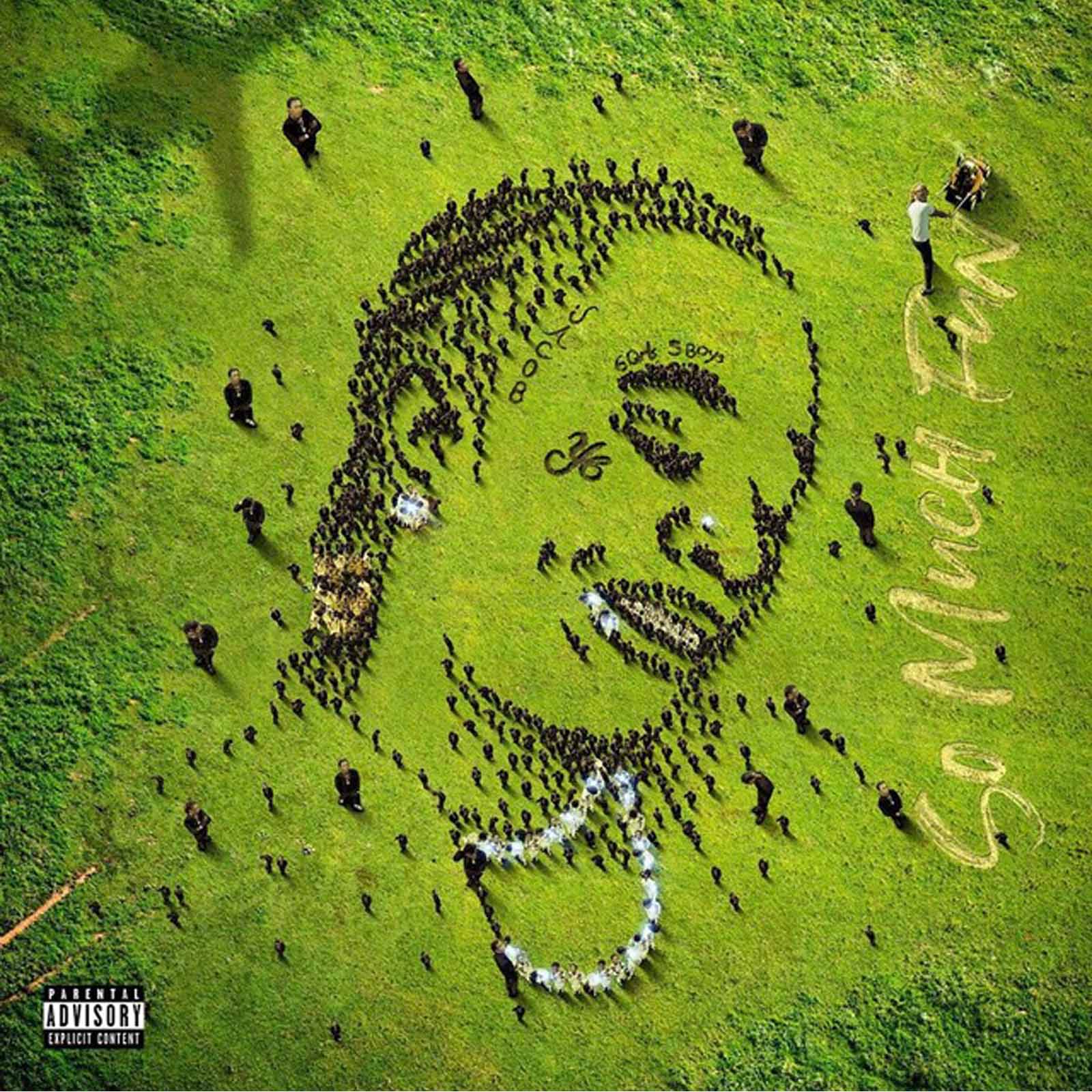About halfway through Young Thug’s So Much Fun—the release that is being billed, somewhat arbitrarily, as his debut album—comes a song titled “What’s the Move.” Its intro, both coolly synthetic and warmly pastoral, may remind you of an old Windows desktop background: gentle marimba-like synths, birds chirping back and forth, drum machine finger snaps reverberating like pebbles dropped into a pond. “You can leave your town,” Thug offers in a heavily filtered croon, “and head to another world.” At face value, he’s explaining to a woman that being with him will mean escaping her humble circumstances into a life that involves riding in a Rolls Royce instead of a bus. But against this uncanny backdrop (crafted by young Atlanta producer BL$$D, with assistance from someone named Chef), he may as well be speaking literally, promising to whisk her away from Earth altogether.
In his chaotic early days, Thug might have sustained this weightless mood for the length of the song: something like the crystalline “Florida Water,” from Black Portland, or the slurry “Nigeria,” from 1017 Thug. But “What’s the Move” soon coheres into a more recognizable shape, albeit a compelling one, setting the 1980s Japanese ambient sounds of its intro against a familiar 2010s tropical-pop rhythm track. Thug shifts from his initial freeform melody into nimble staccato syllables, then, at the end of the chorus, a drawn-out post-coital groan. (Genius claims the lyrics to this last part involve getting a woman to “work it on my nose,” but your guess is as good as theirs.) Lil Uzi Vert soon takes over, his singsong flexes about Xanax and sneakers sustaining the vibe without developing it much further.
“What’s the Move,” an undeniably gorgeous piece of music that nonetheless falls just short of the giddy revelation promised at its outset, is indicative of So Much Fun as a whole, in ways both good and bad. Young Thug is rapping with a masterful sense of songcraft, over the richest beats of his career, and sharing lots of space with younger artists whose styles he helped to invent. But he’s no longer inventing new styles with every passing bar, or manipulating his own voice with the audacity of a few years ago. When he breaks suddenly into a new register midway through a verse, as on “I Bought Her,” or screeches his way through a series of ad libs, as on “Hot,” it sounds more like a tool calibrated to produce a particular effect than an experiment with unpredictable results. Still, those effects are often dazzling.
If there were ever a time that Young Thug might feel pressure to abandon his most distinctive tendencies and take a shot at sanitized mainstream stardom, that time would be now. He’s got multiple songs in the Top 40, both as lead and featured artist. And though he’s released several cohesive full-length statements since first emerging in the early 2010s, the powers that be have decided for some reason that So Much Fun is his true debut, a virtually meaningless distinction in the streaming era. Mercifully, this is not his anodyne pop move. There are no overwritten trap-lite power ballads a la “Goodbyes,” his current top-10 collaboration with Post Malone, thank god. Aside from the tacked-on presence of “The London,” featuring J. Cole and Travis Scott, first released as a standalone single in May and now a modest hit, nothing here seems included with radio play in mind.
Instead, So Much Fun is more like a continuation of 2017’s tuneful and relatively understated Beautiful Thugger Girls. The album maintains that mixtape’s emphasis on streamlined songs, but drops its howdy-doody aesthetics (which were mostly pretty surface-level, anyway) in favor of ultramodern productions from a roster including familiar names like Wheezy, Pi’erre Bourne, and 808 Mafia’s Southside. Everyone brought their A-game to the project, always lacing their beats with one more eardrum-tickling musical element than is strictly required of them: the flute counterpoint to a martial brass line on Wheezy’s “Hot”; the horror-movie organs that haunt Southside and Pvlace’s “Big Tipper;” the lilting melody of Pi’erre Bourne“Surf,” floating downward like a feather on the breeze. On the latter, Thug is at his lewd and freewheeling best, reviving the Shop Boyz’ glorious “Totally dude!” ad lib and rapping about a “pussy so tight I had to finger her shit with a stick.”
Several of the standout songs, like “Just How It Is” and “Circle of Bosses,” involve chord changes that allow Thug to flex his melodic chops, which are as strong here as they’ve ever been. On “Lil Baby,” another highlight, he turns three notes into a hypnotic mantra, accompanied by a pitched-up alien version of himself. If it seems at times it’s like he’s abandoned his power to drop your jaw with a sound you’ve never heard another human make before, he’s making up for it with his subtler gift for twisting tunes into unexpected curlicues. The guest spots on So Much Fun are uneven, but the most effective ones come from Thug’s YSL Records proteges, who often use their verses to mimic the sorts of wild vocal techniques that their mentor is largely eschewing this time out. Lil Keed’s throaty high register on “Big Tipper” gives lines like “my ho want a Percocet, she pop more than you and me” a strange sense of desperation; Lil Duke’s growls on “Gucci Cartier Scarf,” which sound like a direct imitation of Thug’s on “Harambe” from Jeffrey, make for one of the album’s hardest moments.
The refined weirdness of So Much Fun makes for a thoroughly pleasurable album, if not always a surprising one. And occasionally, the heightened attention to detail leads to some genuinely new territory. Thug’s verse on “Hot” begins with some of the album’s most abstract vocal work, in a series of short syllables as sharp and tiny as pinpricks. The slow-mo fanfare accompaniment from Wheezy heightens the idiosyncrasy of this moment rather than flattening it. The music hollows out and the echoes widen, turning Thug’s “cash, money, checks” utterances into a ghostly overture with a distinctly different character from the rest of the song. Thug’s early approach often involved working against the grain of the beat; now, when he does something similarly unconventional, the beat shifts to accommodate him.
Young Thug is far from the first musician who began his career on a radically inventive streak before settling into a more conventional and reliably professional middle period. As you grow as an artist and learn what works and what doesn’t, it’s natural at some point to focus on honing your existing strengths rather than looking for new ones. Some classic records have been made in this mold; plenty of dull ones, too. So Much Fun is somewhere in the middle, with a handful of legitimately great songs, only a couple you may end up skipping, and none that sound like someone forgot to send them to the mastering engineer. “If you’re not having fun or in a fun mood, don’t even play this album,” Thug has said, and it’s true that everything here would sound great at a party. Still, his modest quote understates the artistry he brings, even to a conservative album by his standards. Young Thug is at his slickest on So Much Fun, but there’s still no one else like him.





